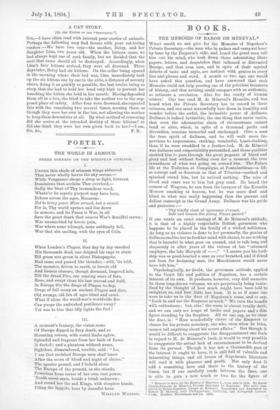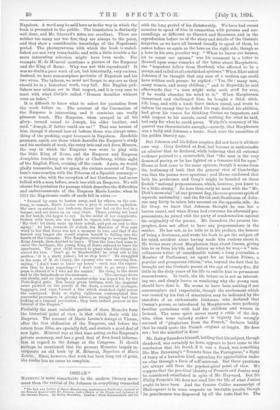B 00K S.
* Nolnoirs to Soto for thy History of Napoicon 1.. front MN fa 152. By Baron Claude-Francois 4o 116novc1, Privats _Secretary to Napoleon. The work eon]. Vglt.)°ecritijVaNiTrrcipo; .Ptuk jgoiLli rd:rimir64.1704;t S vol.& London ; Hutchinson andgOo. 18u4. Translated and Annotated by'
rants. and Autograph Lettere-.
THE MEMOIRS OF BARON DE 3PIENEVAL.* WHAT would we not give for the Memoirs of Napoleon's Private Secretary,—the man who in palace and camp at hour by hour by the Emperor's side, and heard the great man roll' him out his mind, who took down those astonishing State papers, letters, and despatches that inflamed or distracted Europe, and that even now, and in spite of their myriad defects of taste and style, are instinct with genius in every line and phrase and word. A month or two ago one would have asked this question, and have answered that such Memoirs could not help proving one of the priceless treasures of history, and that nothing could compare with so authentic, so intimate a revelation. Alas for the vanity of human wishes ! One has read M. de Moneval's Memoirs, and has heard what the Private Secretary has to record in three volumes, and one must sorrowfully bow down in humility and wonder before the awful, the invincible power of dullness. Dullness is indeed invincible, the one thing that never varies, that even the adamantine chain of circumstance cannot bend or alter, which, in spite of a thousand perils and diversities, remains immortal and unchanged. Give a man the true spirit of dullness, and he will walk more im- pervious to impressions, striking, wonderful, heart-shaking, than if he were swaddled in a feather-bed. M. de MESneval was dullness and respectability personified, and these qualities enabled him to pass through the great pageant of blood and glory and lust without feeling even for a moment the true inwardness of what was going on around him. The Palace life at the Tuileries, at Compibgne, at Fontainebleau—a life as corrupt and as decorous as that of Tiberius—seethed and splashed round him, but he noticed nothing. The mire of blood and roses was to him but grey sand. He heard the cannon of Wagram, he saw from the terraces of the Kremlin Moscow smoking to heaven, but he was more deaf and blind to what was really happening than the poorest and dullest conscript in. the Grand Army. Dullness was his guide and protector :— "Thy kindly cloak of ignorance o'ercast, Safe and unseen the young Xneas passed."
If one wants an exact analogy of M. de M6neval's attitude, it is that of a highly respectable British governess who happens to be placed in. the family of a wicked nobleman, 'As long as no violence is done to her personally, the genius of dullness enables her to feed her mind with shams, to see nothing that is harmful in what goes on around, and to talk long and eloquently in after years of the virtues of, her "esteemed employer, the late Marquis of —." "I assure you his lord- ship was as good-hearted a man as ever breathed, and if it had not been for designing men, the Marchioness would never have left him."
Psychologically, no doubt, the governess attitude, applied to the Court life and politics of Napoleon, has a certain interest of its own. It produces, however, very dull memoirs. In these long-drawn volumes, we are perpetually being tanta- lised by the thought of how much might have been told to enlighten. us, and how little has been. It is as if some one were to take us to the door of Napoleon's room, and to say, "Look in and see the Emperor at work." We turn the handle with enthusiasm; but, alas ! the room is almost totally dark, and we can only see heaps of books and papers and a dim figure standing by the fireplace. All we can say, as we close the door, is : "How wonderfully clever of the Emperor to choose for his private secretary, one who, even when. he tries, cannot tell anything about hie secret affairs." But though it would be difficult to exaggerate the disappointment one feels in regard to M. de M6neval's book, it would be very possible to exaggerate the actual lack of entertainment to be derived from its perusal. Though it has not a thousandth put of the interest it ought to have, it is still full of valuable and interesting things, and all lovers of Napoleonic literature will read it with pleasure and profit. Not only does it add a something here and there to the history of the times, but if one carefully reads between the lines, one is able to gain a new touch or two for the figure of Napoleon. A word may be said here as to the way in which the book is presented to the public. The translation is distinctly well done, and Mr. Sherard's notes are excellent. There are neither too many nor too few, they are always to the point, and they show a considerable knowledge of the Napoleonic period. The photogravures with which the book is embel- lished are not very remarkable, and with a little trouble a far .inore interesting selection might have been made. For example, M. de Meneval mentions a picture of the Emperor and the King of Rome. Why was not this reproduced? It was no doubt a poor work of art, but historically, very curious. Instead, we have commonplace portraits of Napoleon and his two wives. The indexes, we must not forget to say, are as they should be in a historical work, very full. But English pub- lishers now seldom err in that respect, and it is very rare to meet with what Carlyle called "Human inanities without even an index."
It is difficult to know what to select for quotation from the work before us. The account of the Coronation of the Emperor is interesting, and it contains one really pleasant touch. The Emperor, when arrayed in all his glory, turned round to Joseph, his elder brother, and said, "Joseph, if father could see us ! " That was human of him, though it showed how at bottom there was always some- thing of the pushing, eager bourgeois in Napoleon. Readable passages, again, are those which describe the Emperor's study and his methods of work, the entry into and exit from Moscow, the way in which the Emperor was wont to play with the little King of Rome, and the Emperor and Empress Josephine lunching on the dyke at Cherbourg, within sight -of the English Fleet, cruising of the coast. Again, we would gladly transcribe, had we space, the curious account of Napo- leon's conversation with the Prioress of a Spanish nunnery,— a woman who, with the exception of her Confessor, had never talked with a man before, much less with an Emperor. We will -choose for quotation the passage which describes the difficulties and embarrassments of the Empress Marie Louise, when in 1814 the Napoleonic castle of cards fell in ruins :— "Pressed by some to hasten away, and by others, on the con- trary, to remain, Marie Louise was a prey to extreme agitation. She once re-entered her bedroom, threw her hat on the bed in a temper, ana sat down on an easy chair. There, resting her head on her hands, she began to cry. In the midst of her complaints, , broken with tears, she was heard to repeat, with impatience My God ! let them make up their minds, and put an end to this agony.' At last, towards 10 o'clock, the Minister of War sent word to her that there was not a moment to lose, and that if she tarried any longer she would expose herself to falling into the hands of the Cossacks. The Empress, receiving no message from King Joseph, then decided to leave. When the time had come to ,enter the carriages, the young King of Rome refused to leave his apartment. The poor child seemed to guess what the future re- served for him. Don't go to Rambouillet,' he cried out to his
mother, it is a nasty palace ; let us stop here He struggled in the arms of 31, de Caniry, the equerry who was carrying him, saying, 'I don't want to leave my house '—such was the expres- sion that he kept repeating—'I don't want to go away; since papa is absent it is I who am the master.' He clung to the doors and to the balustrade on the staircase The carriage drove out slowly, and as though a counter-order was hoped for, by the Pont-Royal gate. Ten heavy green berlines, with the imperial arms painted on the panels of the doors, a crowd of carriages, baggages, and vans, formed a line which stretched right across the courtyard. Sixty or eighty sightseers contemplated this sorrowful procession in gloomy silence, as though they had been looking at a funeral procession ; they were indeed present at the funeral of the Empire."
Probably the most valuable portion of these Memoirs from the historical point of view, is that which deals with the Empress. The account of Marie Louise's doings at Vienna, after the first abdication of the Emperor, and before the return from Elba, are specially full, and contain a good deal of new light. Maeval was at that time acting as the Empress's private secretary, and has a good deal of first-hand informa- tion in regard to the doings at the Congress. It should perhaps be mentioned that the present Memoirs largely in- corporate an old book by M. Meneval, Napoleon et Marie Louise, Since, however, that work has been long out of print, the reader has no cause to complain.



































 Previous page
Previous page